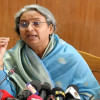Our expectations from Dhaka University

Politics at the University of Dhaka has played a significant role in various decisive moments of Bangladesh's history. However, partisan politics deterred its overall academic atmosphere for more than three decades. Partisan politics of both students and teachers has proven to be damaging for academic excellence. Just as student politics was followed by gono room culture and torture cells, teacher politics also destroyed the checks and balances in the administration system. Such types of student and teacher politics should be banned, and students' councils should be revived.
In a resource-constrained university, politics works as a means for one to get a piece of the pie. Being politically involved increases the probability of one getting a position of authority such as the vice-chancellor, dean, provost, house tutor, and so on. It also assists many to get important positions outside the university. The appointment of the VC, who decides on major issues, must be significantly modified, and it must be ensured that their authority does not make them autocratic. A VC guarded by a gunman and his residence guarded by police seem strange.
The present practice of recruiting pro-VC, treasurer, proctor, provost and house tutors must also be revised. The dean election, which is mired in many problems like recruitment, promotion and formation of different committees, should be stopped. The practice of a dean becoming the editor of the journal published from their faculty must end.
The administrative section (registrar's building) is perhaps the most inefficient part of the university. Its employees should be smart and efficient, and their service delivery mechanism should be a standard-setter. Unfortunately, that is not the case. A big part of the administration staff doesn't have computer literacy. The entire administrative section needs restructuring and modernisation.
At a good university, students remain engaged in studies and they rarely have spare time. But this university offers degrees in many subjects where students have to spend a bare minimum time in studies to earn decent grades. The syllabuses of these subjects require an upgrade.
Over the past 20 years, numerous departments were opened without rational reasoning. Some of them were opened to recruit political teachers and a few others to place several teachers as chairmen, compromising with quality. For example, some departments under the Faculty of Arts and Faculty of Social Sciences were created that overlapped with those at the Institute of Modern Languages. Some are also contradictory within their respective faculty. At the Faculty of Business Studies, the number of departments more than doubled in just 20 years; in 2003, there were only four departments, which increased to nine. All departments offer BBA and MBA degrees individually, although nearly 40 percent of the courses at undergraduate level are the same in all departments. Besides, the same degrees are offered at the Institute of Business Administration (IBA) as well. There are two departments and one institute which offer the degree related to disaster management. The story is the same in other faculties. Hence, we must prudently look into the possibility of merging and abolishing some departments.
Most of the departments have unusual numbers of students. Almost all students who attain an undergraduate degree from the University of Dhaka tend to pursue a master's degree as well. There could be many students at the undergraduate level, but not the same at the master's level. There must be a separate test for master's admission, which should remain open to students from other universities as well.
A lecturer is appointed just after completing their master's degree. Sometimes, a candidate may join as a lecturer a few months after their graduation. There is no meaningful training for the new recruit. Consequently, they often fail to manage their class. But a good university appoints lecturers after finishing another degree, preferably a PhD.
It is also peculiar that the university tries to recruit teachers with higher degrees and good research profiles but offers poor salaries. The salary of a university lecturer does not differ significantly from that of a college lecturer. A portion of these teachers do not allocate much time to the university due to low pay. They come to the campus when they have classes. They stop research after becoming a professor. Some make extra money by other means. The low salary cannot bring in foreign faculties to the university. Even with this low pay, a huge percentage of teachers engage in rigorous research and give much time to the university. The salary structure must be revised to support a better standard of living for the teachers. Once it is revised, all teachers must be held to account, and they should achieve their yearly research target.
Taking the opportunity of low salary, some positions are allocated based on political affiliation. By offering these positions, the teachers are made subservient to partisan politics. A house tutor, for instance, gets nominal allowance, pays lower house rent, and their experience as a house tutor is counted for promotion. This should be ended as well.
The University of Dhaka is at the top of many students' list of universities around the country. But when they get admission here, most of them face issues with accommodation. The university does not allow first-year students to stay in the residential halls. But they get space there by making "friends" with political leaders and getting involved in politics. This hampers their studies and they cannot attain good grades during the first year, which affects their subsequent results. Thus, the first-year students must be given priority when allotting seats in the dormitories. To reduce pressure on residential facilities, no seats can be allotted to the postgraduate students.
The low quality of meals is another major concern in dorms. This is because a large number of political students eat at the cafeterias without paying for them. To offset this loss, low quality food is provided. The hall administration must stop this trend and ensure high quality of food. Moreover, halls should be the abode of all academic and extracurricular activities.
The university medical centre is of no use. Most teachers and staff avoid it because of its failure to provide proper treatment. Students who have the ability to get proper medical treatment elsewhere also avoid it. Thus, this centre must be modernised with facilities to provide basic treatment. The campus must also have some public toilets.
No government has so far shown interest in resolving the fundamental problems that plague the University of Dhaka. As is normal, a university with a lack of resources poses fewer threats to the position of authority. Once these problems are fixed, students and teachers will be less dependent on partisan politics and have more room to be open-minded free thinkers. They will be driven by reasoning and always challenge authority. It is not the scarcity of resources that keeps the problems unresolved; it is simply a lack of intention to solve these issues. Let the good intention prevail among the new administration to free this university of all its ailments.
Dr Md Main Uddin is professor and former chairman of the Department of Banking and Insurance at the University of Dhaka. He can be reached at [email protected].
Views expressed in this article are the author's own.
Follow The Daily Star Opinion on Facebook for the latest opinions, commentaries and analyses by experts and professionals. To contribute your article or letter to The Daily Star Opinion, see our guidelines for submission.

 For all latest news, follow The Daily Star's Google News channel.
For all latest news, follow The Daily Star's Google News channel. 











Comments